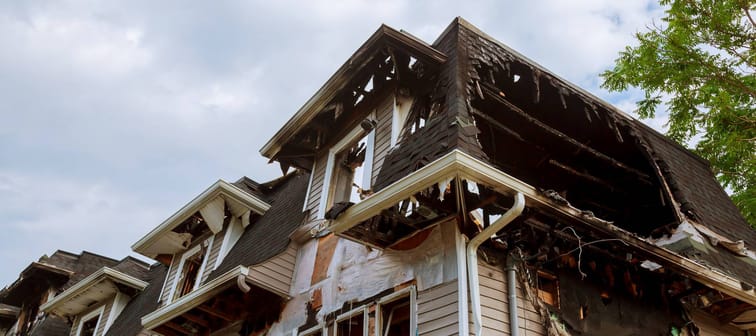How do you know what a policy does cover?
When homeowners shop around for an insurance policy, they ultimately have to choose between two main types: named perils coverage and all-risks coverage.
With named perils coverage, you’ll only be covered for disasters and accidents listed by name in your policy. Those typically include things like fire, theft and pipe leaks.
By contrast, all-risks coverage promises to provide compensation for any problem, as long as it’s not specifically listed as an exemption.
You can expect a broader level of protection from an all-risks insurance policy — as well as a higher price tag — but the name can be a little deceiving, as not all risks will truly be covered. That’s why you’ll sometimes see them called “open perils” or “special perils” instead.
Stop overpaying for home insurance
Home insurance is an essential expense – one that can often be pricey. You can lower your monthly recurring expenses by finding a more economical alternative for home insurance.
SmartFinancial can help you do just that. SmartFinancial’s online marketplace of vetted home insurance providers allows you to quickly shop around for rates from the country’s top insurance companies, and ensure you’re paying the lowest price possible for your home insurance.
Explore better ratesWhich disasters won’t insurers cover?
Even if you have all-risks coverage, the fine print on your policy will list a whole whack of common and not-so-common disasters you’ll have to face on your own.
Here are some of the biggest threats most insurers won’t touch:
Acts of war
Most policies have clauses that free the insurer from paying for damage resulting from acts of war. The reason insurers include these clauses in their contracts is two-fold.
First, it’s hard to guess the likelihood of a war on U.S. soil and just how much damage one could cause. As a result, insurers can’t accurately estimate risk in their underwriting process.
And second, a big enough war could inflict cataclysmic damage to whole towns and cities. The number and size of claims could be massive, resulting in the insurer going belly up in a flash.
Nuclear fallout
Like with acts of war, it’s just about impossible for ordinary insurers to accurately underwrite the risks of nuclear, biological, chemical and radiological (NBCR) events. And having to issue payouts could be financially catastrophic.
If an accident happens at a nuclear power plant, the plant operators and their insurers will be on the hook for the first few billion dollars in public damages. After that, it’s up to Congress to decide whether it wants to foot the bill.
And in most states, insurers don’t have to offer coverage for NBCR events caused by an act of terror.
An angry Earth
If you ever feel the Earth move under your feet, we have more bad news for you: Any damage to your home probably won’t be covered by your insurance.
Landslides, mudflows, earthquakes and floods aren’t covered in a standard homeowners insurance policy.
Fortunately, you can generally buy separate coverage for those threats.
Seizures by Uncle Sam
Theft is generally covered by your home insurance policy. However, if your house or belongings are grabbed by the government, you’re on your own.
Through the power of “eminent domain,” federal and state governments will seize private property to make room for public projects like highways. You’ll be compensated, but only by the government.
And don’t expect your insurer to replace any of your stuff seized as evidence during a criminal investigation.
Plagues of vermin
Many home insurance policies will cover at least some damage from a wild animal. If a deer damages your fence or a bear tries to break through your patio door, you could get some help to cover the repairs.
However, damage from insects, rodents, birds and the like typically isn’t covered by your standard policy.
Insurers see bug infestations and bat colonies as a preventable maintenance issue, so they tend to exclude them from their policies. Even if a tide of vermin attacks your neighborhood — consider the recent mouse plague in Australia — you’ll probably still be out of luck.
Don’t panic just yet
While no policy will protect you from everything, you might be surprised by all the common and crazy things a typical home insurance policy will cover.
When a curious cat turns on your tap and floods your home, or a chunk falls off an airplane and smashes a hole in your roof, most insurance companies will have your back.
If you’re looking to buy a policy or rethinking your current coverage, remember that shopping around for a better rate can result in dramatically lower premiums.
With those savings on lock, you’ll have extra room to expand your coverage. That way you’ll be prepared for any kind of disaster — at least the standard, non-”act of God” ones you can see coming.
Sponsored
Unexpected vet bills don’t have to break the bank
Life with pets is unpredictable, but there are ways to prepare for the unexpected.
Embrace Pet Insurance offers coverage for treatment of accidents, illnesses, prescriptions drugs, emergency care and more.
Plus, their optional wellness plan covers things like routine vet trips, grooming and training costs, if you want to give your pet the all-star treatment while you protect your bank account.






